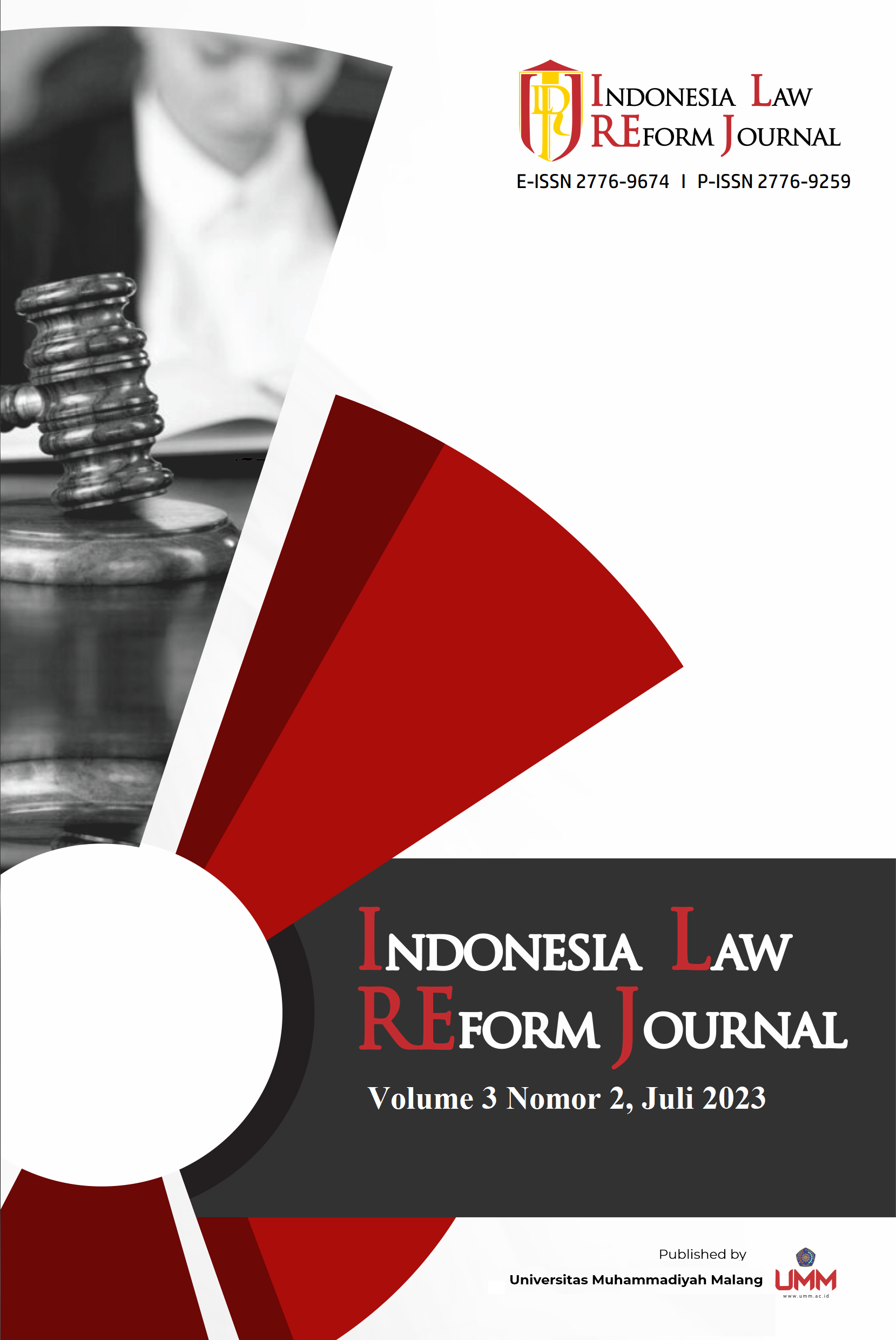Analysis The Effectiveness of E-Court System at The Religious Court of Bangil Based on Simple Principles Quickly and Low Cost
DOI:
https://doi.org/10.22219/ilrej.v3i2.25524Keywords:
Effectiveness, E-Court System, Religious CourtAbstract
A system can be declared successful if its application in the field has achieved predetermined objectives. The Supreme Court as the highest agency in the judicial sphere has issued a system to register cases and trials in court electronically, one of which is the Bangil Religious Court. The purpose of the study was to determine the application of the e-court system in the examination of cases at the Bangil Religious Court and to determine the effectiveness of the e-court system at the Bangil Religious Court. Research methods used by researchers are sociological empirical research methods that describe the actual environmental conditions of society supported by data and facts obtained by conducting interviews and observations. The results showed that: 1) The examination of cases at the Bangil Religious Court has not fully implemented the examination of cases using the e-court system because one of the agendas for examining cases in the trial, namely the agenda of evidence, is still carried out manually. 2) Effectiveness of e-court system implementation The Bangil Religious Court cannot run effectively because 4 factors of legal effectiveness cannot be met, namely Law Enforcement Factors there are obstacles experienced by judges in the verification process in the e-court system, Facilities and Infrastructure Factors related to network system constraints from the center and facilities that are less attractive to the community, Community Factors that do not understand technological developments, Cultural Factors The difficulty of transitioning people's way of life from conventional to electronic. The factor that is fulfilled is Law Enforcement Factors evidenced by the issuance of PERMA Number 1 of 2019. Suggestion that the Supreme Court improve network repair and maintenance on the e-court system to avoid system errors at certain times and often conduct socialization related to e-court renewal.
Downloads
References
Adiputra, I Gede Mahendra Juliana, Ida Ayu Putu Widiati, and Ni Made Puspasutari Ujianti. “Penyelesaian Perkara Pelanggaran Hak Atas Merek.” Jurnal Preferensi Hukum 1, no. 2 (September 2020): 67–71. https://doi.org/10.22225/jph.1.2.2343.67-71.
Ahadi, Lalu M. Alwin. “Efektivitas Hukum Dalam Perspektif Filsafat Hukum: Relasi Urgensi Sosialisasi Terhadap Eksistensi Produk Hukum.” JURNAL USM LAW REVIEW 5, no. 1 (April 14, 2022): 110–27. https://doi.org/10.26623/JULR.V5I1.4965.
Anggraeny, Isdian. “Legal Review Of Selling Land Of Inheritance Without Approval Of All Heirs.” Legality : Jurnal Ilmiah Hukum 28, no. 1 (April 2020): 107–20. https://doi.org/10.22219/ljih.v28i1.11817.
Benuf, Kornelius, and Muhammad Azhar. “Metodologi Penelitian Hukum Sebagai Instrumen Mengurai Permasalahan Hukum Kontemporer.” Gema Keadilan 7, no. 1 (2020): 20–33. https://doi.org/10.24246/jrh.2019.v3.i2.p145-160.
Hidayah, Nur Putri, and Galih Wasis Wicaksono. “Legal Knowledge Management System on Family Law for Society.” Jurnal Hukum Novelty 11, no. 1 (February 28, 2020): 68–85. http://intelektual.org/index.php/Novelty/article/view/15614.
Latifiani, Dian. “Human Attitude and Technology: Analyzing a Legal Culture on Electronic Court System in Indonesia (Case of Religious Court).” Journal of Indonesian Legal Studies 6, no. 1 (May 2021): 157–84. https://doi.org/10.15294/jils.v6i1.44450.
N, Juliana S, Achmad P Jumeri, Otih Handayani, Juliana S Ndolu, Achmad Jumeri Pamungkas, and Douglas Napitupulu. “Effectiveness Of Law Enforcement Case By The Cartel Commission Honda And Yamaha Based On Justice Pancasila.” Jurnal Ius Constituendum 5, no. 1 (May 13, 2020): 1–14. https://doi.org/10.26623/JIC.V5I1.1980.
Naylla, Keysha Salma, and Efa Laela Fakhrian. “Implementasi Peraturan Mahkamah Agung No. 7 Tahun 2022 Tentang Administrasi Perkara Dan Persidangan Di Pengadilan Secara Elektronik Dalam Hal E-Summons Di Pengadilan Agama Kota Bandung.” COMSERVA: Jurnal Penelitian Dan Pengabdian Masyarakat 3, no. 4 (2023): 1523–37. https://doi.org/10.59141/comserva.v3i4.918.
Nuh, Ferlyawan Isnanda, Herwastoeti Herwastoeti, and Dwi Ratna Indri Hapsari. “Implementation of E-Court in Civil Life Settlement to Realize Simple Principles Quickly and Low Costs (Study in Malang District Court Class 1a).” Indonesia Law Reform Journal 2, no. 3 (December 9, 2022): 367–81. https://doi.org/10.22219/ILREJ.V2I3.23264.
Nurmiati, Nurmiati, Sufirman Rahman, and Ahyuni Yunus. “Efektivitas Proses Pendaftaran Tanah Hak Milik.” Kalabbirang Law Journal 2, no. 2 (July 2020): 101–12. https://doi.org/10.35877/454RI.kalabbirang123.
Pelu, Ibnu Elmi As, and Ahmad Dakhoir. “Marital Property within the Marriage Law: A Debate on Legal Position and Actual Applications.” Al-Jami’ah: Journal of Islamic Studies 59, no. 2 (November 11, 2021): 287–316. https://doi.org/10.14421/AJIS.2021.592.287-316.
Priyadi, Aris. “Implementasi Beracara Secara Elektronik (E-Court) Dalam Perkara Perdata.” Cakrawala Hukum: Majalah Ilmiah Fakultas Hukum Universitas Wijayakusuma 23, no. 1 (2021): 91–99. https://doi.org/10.51921/chk.v23i1.145.
Setiawan, Daryanto. “Dampak Perkembangan Teknologi Informasi Dan Komunikasi Terhadap Budaya.” JURNAL SIMBOLIKA: Research and Learning in Communication Study 4, no. 1 (April 2018): 62. https://doi.org/10.31289/simbollika.v4i1.1474.
Sitompul, Anifah. “Oleh Ahli Waris Tanpa Persetujuan Sebagian Ahli Waris ( Studi Kasus Putusan Pengadilan Tinggi Agama Nomor 96 / PDT . G / 2014 / PTA MDN ),” 2014, 1–15.
Suardi, Suardi, Nursalam Nursalam, Israpil Israpil, Hasnah Kanji, and Rahmat Nur. “Model of Strengthening Students’ Intelligent Character in Facing Changes in Society in the Industrial Revolution Era.” AL-ISHLAH: Jurnal Pendidikan 14, no. 2 (May 2022): 1419–30. https://doi.org/10.35445/alishlah.v14i2.1061.
Susanto, Susanto. “E-Court As The Prevention Efforts Against The Indonesia Judicial Corruption.” Yustisia Jurnal Hukum 9, no. 1 (May 2020): 116. https://doi.org/10.20961/yustisia.v9i1.41127.
Susanto, Susanto, Muhamad Iqbal, and Wawan Supriyatna. “Menciptakan Sistem Peradilan Efisien Dengan Sistem E-Court Pada Pengadilan Negeri Dan Pengadilan Agama Se-Tangerang Raya.” JCH (Jurnal Cendekia Hukum) 6, no. 1 (September 2020): 104. https://doi.org/10.33760/jch.v6i1.287.
Turatmiyah, Sri, Muhammad Syaifuddin, Annalisa Yahanan, Febrian Febrian, and Arfianna Novera. “Does Judge Has Ex Officio Rights In Determining Mut’ah and Iddah?” Sriwijaya Law Review 3, no. 2 (July 31, 2019): 187–98. https://doi.org/10.28946/SLREV.VOL3.ISS2.249.PP187-198.
Ulfanora, Ulfanora, Dian Amelia, and Harry Azhar Aziz. “Penerapan Persidangan Secara Elektronik Di Pengadilan Negeri Sumatera Barat.” Jurnal Hukum Bisnis Bonum Commune, 2022, 84–97. https://doi.org/10.30996/hukum%20bisnis%20bon.v5i1.5792.
Zubairi, Zubairi, Nurdin Nurdin, and Rahmat Solihin. “Islamic Education in the Industrial Revolution 4.0.” Scaffolding: Jurnal Pendidikan Islam Dan Multikulturalisme 4, no. 3 (2022): 359–71. https://doi.org/10.37680/scaffolding.v4i3.2118.
Downloads
Published
How to Cite
Issue
Section
License
Copyright (c) 2023 Nur Ainun Sakinah

This work is licensed under a Creative Commons Attribution-ShareAlike 4.0 International License.











